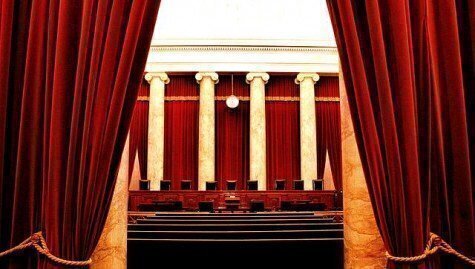The Supreme Court on Thursday appeared to concede the practical reality that a ninth Justice will not be approved for the bench until several weeks into the new Trump administration. It did so by releasing a schedule of hearings for the February session that, once again, omits three cases that have been on hold since last January and, under normal timing, would have been heard weeks ago.
 From every indication, those three cases appear to have been postponed repeatedly because the Justices have reason to think a decision in each might split the Court 4-to-4, settling nothing. Thus, those three likely will not be heard until a replacement for the late Justice Antonin Scalia has been nominated by President-elect Trump after he takes office January 20, and approved by the Senate.
From every indication, those three cases appear to have been postponed repeatedly because the Justices have reason to think a decision in each might split the Court 4-to-4, settling nothing. Thus, those three likely will not be heard until a replacement for the late Justice Antonin Scalia has been nominated by President-elect Trump after he takes office January 20, and approved by the Senate.
The cases involve disputes over churches’ claim of an equal right to receive state government benefits, the scope of government power to take private property for public use, and a high-stakes dispute over claimed defects in Microsoft Corporation’s popular Xbox 360 game console.
The Court has only two more scheduled argument sessions in this Term — in March and April. If a Trump nominee is deeply controversial, opposition from Democrats in the Senate could prolong the process, possibly delaying further the addition of a ninth Justice. A new Justice ordinarily would not take part in decisions on cases already heard before that Justice arrived but not yet decided.
The February schedule is noteworthy for another reason: under normal circumstances, the Justices would have heard at least 10 cases during that two-week sitting, but actually will only hear seven. On only two of the five days (one normal hearing day is a legal holiday) will the Court hear two cases — the more customary number. On the other three days, only one case each day is set.
The low number of hearings in February is a reflection of the Court’s caution, with only eight Justices available, in taking on additional significant disputes that might wind up in tie votes.
Only two of the seven cases in February raise noteworthy constitutional issues. One case is a test of whether the Fourth Amendment ban on unreasonable actions by police officers applies to an individual who is killed in another country by a U.S. officer. The case of Hernandez v. Mesa, set for February 21, involves the shooting across the U.S. border of a Mexican youth by a U.S. Border Patrol officer, firing from the U.S. side of the border.
The other involves the question of whether it violates the First Amendment right of free speech for a state to bar a convicted sex offender from using social media sites to which minors have access. The case of Packingham v. North Carolina is to be heard on February 27.
Here, in brief, is the full February schedule, with each case set for one hour of argument:
Monday, February 20 — legal holiday; no hearing.
Tuesday, February 21:
The cross-border shooting case, Hernandez v. Mesa. In addition to the Fourth Amendment issue, the Court has added a question on whether the Mexican youth’s family has any legal right to sue the Border Patrol officer in a U.S. court.
McLane Co. v. Equal Employment Opportunity Commission — the scope of a federal judge’s duty to enforce a subpoena for evidence issued by the EEOC in a workplace discrimination case.
Wednesday, February 22:
Kindred Nursing Centers v. Clark — validity of a state law that limits the right of an attorney to bind the client to send a legal dispute to an arbitrator.
Monday, February 27:
The case of Packingham v. North Carolina on barring a sex offender’s access to social media.
Esquivel-Quintana v. Lynch (Attorney General) — does a conviction for having consensual sexual intercourse with a minor aged 17 lead to mandatory deportation of a foreign national living in the U.S.?
Tuesday, February 28:
Dean v. United States — scope of federal judges’ power to impose multiple sentences for a person convicted of a drug crime or crime of violence, in which a gun was used.
Wednesday, March 1:
Coventry Health Care of Missouri v Nevils — test of the power of states to put limits on contracts to provide health care coverage for employees of the federal government.Legendary journalist Lyle Denniston is Constitution Daily’s Supreme Court correspondent. Denniston has written for us as a contributor since June 2011 and he has covered the Supreme Court since 1958. His work also appears on lyldenlawnews.com, where this article first appeared.






